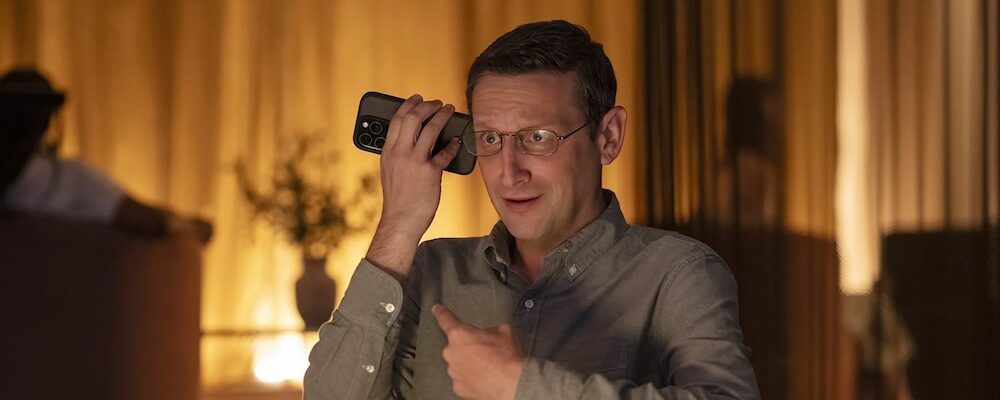HBO’s ‘The Chair Company’ Finds Tim Robinson at His Deranged Best
Tony Sokol
Any workplace comedy is one of manners, usually dictated by Human Resources, but in Tim Robinson’s hands, “The Chair Company” sits on social awkwardness. The HBO series begins with his character, Ron Trosper, having an issue with an office chair, and getting no satisfaction from customer service. This escalates into a paranoid chase down a conspiracy rabbit hole that leads to the pits of international corruption, and at least one climax which reaches angst levels of Martin Scorsese’s “After Hours.” It becomes that crazy, by episode 5, to be exact.
Co-created by Robinson and Zach Kanin, with Andrew DeYoung directing the pilot episode, “The Chair Company” is a comedic thriller. While the stakes are high, the unlikely ad hoc investigator on the case is low in life. Ron is working at the same mall development company he once quit in order to live an independent life. His job designing an outdoor mall in suburban Ohio is frustrating, life is passing him by, and he is prone to obsession. Sometimes this comes out in excessive self-recrimination, other times Ron needs to find something to blame. He can’t be overly angry at his boss, Jeff Levjman (Lou Diamond Phillips), but he can take it out on a chair. Or a thousand chairs. Or a whole network of illegal office chair-dealings wheeling right up to a city hall. It is not only possible, but more probable with each detail uncovered, or threat received.
The chair’s manufacturer is Tecca, but Ron cannot get near them. Tecca, however, can get to him. The first message is delivered along with a crack upside the head from a steel bar. Ron is a normal guy, with a loving wife, Barb (Lake Bell), who is about to get funding for a redesigned breast pump. Their son, Seth (Will Price), is getting a head start on his drinking before heading to college. Their daughter, Natalie (Sophia Lillis), wants to marry her aggressively passive aggressive girlfriend in a haunted house. Lillis brings a daughter’s worried support for her father’s obsessions to the point of dangerously enabling them. They are the most normal family in town.
Ron’s co-workers, on the other hand, are each as quirky as Ron, but not quite as deranged as the people Ron meets while investigating the chair company. Seemingly horrible people, with improbable names like Greg Braccon and Bahld Harmon. They are never what they seem. Just as “The Chair Company” finds sinister undertones in commonplace settings, Robinson and his team find new textures in flawed people with tenuous grasps on reality. Most of the characters carry their own obsessions: food, clothes, bubbles, porn pictures from other people’s phones. Almost every conversation carries an aside, a tangent on some minor point which takes on its own life, bringing unexpected humor into the least appropriate places. A cellphone is thrown into a fountain at an Erotic Emporium, but the resulting argument is about how the soap which replaces water in the display does not “look like rolling waves.”
Robinson does his best acting between words. Ron carries his shame with a silence so intense you can hear it pouring out of his eyes. Robinson’s stifled screams, full body contortions, and the most animated facial expressions since “Looney Tunes,” bring tension, hyperventilation, and propulsion to every situation. Unless Ron is paired with Mike Santini (Joseph Tudisco), a whack job so unpredictable he steals more than just the scenes.
“The Chair Company” doesn’t stretch believability because reality is subject to subversive forces. This series works as commentary on paranoia, or the breakdown of empty nest syndrome from a man’s perspective, as well as a conspiracy investigation satire. Like most of Robinson’s work, it may be considered an acquired taste. Those who have sampled “I Think You Should Leave” or “Friendship” will find this a new high bar. New viewers should put in the time instead of rejecting the unfamiliar and uncomfortable, because these characters grab you just like conspiracy nabs Ron.
“The Chair Company” premieres Oct. 12 on HBO and airs Sundays at 10 p.m. ET.

